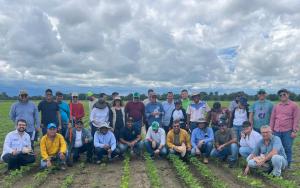Preliminary data were presented by Professor Alencar Zanon
Professor Alencar Zanon, from UFSM, a consultant at the United Nations Industrial Development Organization (UNIDO), presented the preliminary results of the rice/soy rotation system project in Venezuela. This project is part of the master’s thesis by João Souza, at the Graduate Program in Agricultural Engineering (PPGEA) and the final paper by Cintia Piovesan in the Agronomy program at the Rural Sciences Center (CCR). Both are participants in the FieldCrops Team.

On June 4 and 5, directors of the agriculture sector, farmers, and experts engaged in this project discussed the preliminary results in the technical room of the Asoportuguesa project. This association, along with Fundarroz, Polo Agropecuario, Fondesoya, and Flar, leads the development of this initiative.
The results, although not yet final, indicate a potential yield in Venezuela of 5.8 tons per hectare for soy and 9.8 tons per hectare for rice, based on the country’s environmental conditions, according to Zanon.
Based on the project’s results, a realistic goal would be to achieve yields of 4 tons per hectare for soy and 8 tons per hectare for rice. This target represents approximately 80% of the potential yield, as striving for 100% would involve higher risks and costs.
Data from over 400 crops and more than 40 producers in the states of Portuguesa, Guárico, and Cojedes were analyzed, covering a total surface area equivalent to 7,139 hectares. José Luis Pérez, president of Fevearroz and director at Fedeagro, emphasized that there has never been such a detailed study on this system before.
On June 6 and 7, technical visits were conducted to evaluate the demonstration plots of soy in the fields of producers Venturino Cicconetti and Aurelio Cazulani.
Zanon comments that the results of this project have contributed to the development of high-quality human resources and will position Venezuela at the forefront of sustainable food production in global agriculture.
